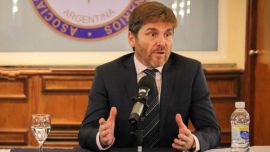Italy took a sharp turn to the right Monday after Giorgia Meloni's Eurosceptic populist party swept to victory in general elections, putting the one-time Mussolini admirer on course to become the first woman to lead the country.
Meloni's Brothers of Italy party, which has neo-fascist roots, won 26 percent in Sunday's election, according to partial results.
It leads a coalition including former premier Silvio Berlusconi and Matteo Salvini's far-right League, which looks set to win a majority in parliament and install the most right-wing government since World War II.
Meloni's success represents a seismic change in Italy – a founding member of the European Union and the eurozone's third largest economy – and for the EU, just weeks after the far-right outperformed in elections in Sweden.
"Meloni takes Italy," read the Repubblica daily's headline, while editorialist Stefano Folli said it was "the first time in decades that the country's political face has transformed so completely."
Meloni, whose campaign motto of "God, country and family" has sparked fears of a regression on rights in the Catholic-majority country, used her first public statement to emphasise unity.
She will govern "for all Italians," she told an early morning press conference. "We will do it with the aim of uniting people, of enhancing what unites them rather than what divides them."
But the 45-year-old, whose party has never held office, has huge challenges ahead, from soaring inflation, to a looming energy crisis and the war in Ukraine.
'Proud, free Europe'
Congratulations came in quickly from Meloni's nationalist allies across the continent, from Polish Prime Minister Mateusz Morawiecki to Spain's far-right party Vox.
"Meloni has shown the way for a proud, free Europe of sovereign nations," Vox leader Santiago Abascal tweeted.
But Spanish Foreign Minister José Manuel Albares warned that "populist movements always grow, but it always ends in the same way – in catastrophe."
A spokesman for the European Commission said it hoped for "constructive cooperation" with the new government.
"Italy is a very Europe-friendly country with very Europe-friendly citizens and we assume that won't change," added a spokesman for German Chancellor Olaf Scholz.
Meloni and League leader Matteo Salvini are both strongly Eurosceptic, although they no longer want Italy to leave the eurozone.
The Brothers of Italy head says Rome must assert its interests more, and has policies that look set to challenge Brussels on everything from public spending rules to mass migration.
The coalition also wants to renegotiate the EU's post-pandemic recovery fund, arguing that the almost 200 billion euros (US$193 billion) Italy is set to receive should take into account the energy crisis.
But the funds are tied to a series of reforms only just begun by outgoing Prime Minister Mario Draghi, and analysts say she has limited room for manouevre.
Long-lasting government
Meloni had been leading opinion polls since Draghi called snap elections in July following the collapse of his national unity government. Hers was the only party not to join Draghi's coalition in February 2021, making her effectively the only opposition leader.
Salvini highlighted this fact as he rued his League party's poor performance, which at around nine percent is almost half that of its 17-percent showing in 2018. However, he said he would play his part in the new government, which he hoped could "go for at least five years straight."
Turnout fell to a historic low of around 64 percent, and some Italians were sanguine about the result, viewing it a yet another chapter in an infamously unstable country.
"I'm not too pessimistic because Italians, in problematic situations, always find a solution," noted Fabrizio Sabelli, out and about in Rome on Monday morning.
Meloni has distanced herself from her party's neo-fascist past – and her own, after praising dictator Benito Mussolini as a teen – and presented herself as a straight-talking but unthreatening leader.
After being assertive in opposition, she waged a "very cautious, very reassuring campaign," Lorenzo De Sio, head of Italian electoral studies centre CISE, told AFP.
"Her challenge will be to turn this electoral success into a governing leadership... that can last," he said.
Unstable
Italian politics is notoriously unstable, with nearly 70 governments since 1946, and Meloni, Salvini and Berlusconi do not always agree.
They have a joint programme for government, including tax cuts and promises to cut mass migration.
But while Meloni strongly supports the EU's sanctions against Russia over Ukraine, Salvini has criticised them as ineffective.
Meanwhile billionaire media mogul Berlusconi, whose Forza Italia party won around eight percent, has long been friends with President Vladimir Putin.
Democratic party chief Enrico Letta effectively quit after his centre-left party did worse than expected at 19 percent.
Letta, a former premier who had repeatedly warned Meloni was a danger to democracy, said he would not be a candidate in an upcoming leadership contest.
From EU to immigration: Programme of Italy's right-wing
Low taxes, EU reform and support for Ukraine – here are the main points of the joint programme agreed by the right-wing coalition that triumphed in Sunday's elections in Italy.
They were agreed in advance by Giorgia Meloni's far-right Brothers of Italy, Matteo Salvini's anti-immigration League, and Silvio Berlusconi's right-wing Forza Italia.
But Meloni's success – topping the polls, well ahead of her allies – will likely affect how and if they are implemented.
Foreign policy
Salvini and Berlusconi have long been close to Russia but the programme emphasises respect for commitments made as part of NATO and, a key point for Meloni, support for Ukraine in the face of Russia's invasion. It also backs support for all initiatives to find a solution to the conflict.
With Meloni and Salvini's parties both eurosceptic, the programme commits to "full adherence to the European integration process" while seeking a "more political and less bureaucratic" bloc.
It also calls for a review of EU rules on public spending and economic governance.
Furthermore, it calls for the defence and promotion of Europe's "Judeo-Christian" and classical roots.
Economy and social
The programme says Italy should make full use of the almost 200 billion euros (US$193 billion) it has been earmarked under the EU's post-pandemic recovery plan.
But it talks about changing the agreement with Brussels, which requires major structural reforms in return for the money. It says there are "changed conditions," noting rising costs of energy and raw materials.
It calls for a reduction in the tax burden for families, businesses and the self-employed, including a flat tax for the latter.
The citizens' income, an unemployment benefit introduced under the populist Five-Star Movement, will be abolished.
The programme also calls for a revaluation of the minimum pension, social and disability payments.
As inflation soars, there is also a promise to protect the purchasing power of families, workers and pensions, and reduce VAT on energy products.
Institutions
The coalition wants to change the constitution to ensure election by universal suffrage of the president, Italy's head of state who is currently chosen by parliament.
The programme includes a reference to move towards more regional autonomy, a key issue for Salvini's League.
It also calls for reform of the justice system to ensure the "reasonable duration" of trials.
Families
Italy has a declining population and the coalition vows to support the birth rate with measures including free nurseries.
It also calls for employment protection for young mothers, an increase in welfare payments for families, and support for families with disabled dependents.
Security and immigration
Public safety is a priority, with the coalition vowing to fight everything from petty crime to mafias and terrorism, violence against women and the sale and diffusion of illegal drugs.
They also pledge to fight any form of anti-Semitism and Islamic fundamentalism.
Meloni and Salvini have both made fighting mass migration a major part of their campaigns. The coalition pledges border controls and blocking boat landings to stop human-trafficking – in agreement with North African nations.
They also want to create EU-managed centres outside the bloc to evaluate asylum applications.
At the same time, they pledge the more orderly management of legal migration flows, including promotion of the inclusion of new arrivals.
Energy and environment
With Italy's reliance on Russian gas increasingly untenable due to the Ukraine war, the coalition pledges to increase the production of renewable energy, without details.
They say only that they will diversify energy supplies and implement a plan for energy-self sufficiency, including using Italy's national resources, such as natural gas.
They will consider the use of clean and safe nuclear power.
– TIMES/AFP
related news
by Alicia Ritchie & Ella Ide, AFP


























Comments